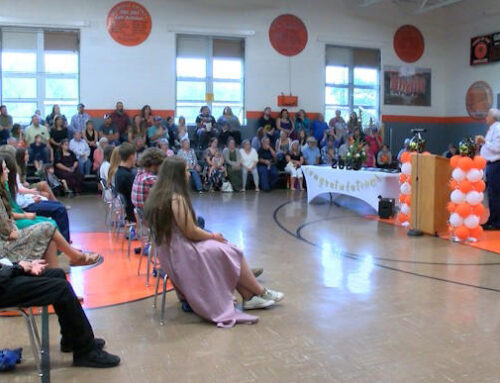Greene County school board bans TV cameras to avoid “sound-bite view”
(March 14 Update: The Greene County school board chairman apologized on March 13 for the TV camera ban. The board proposed language to change its policy to permit “cameras or any other recording devices” in its meetings, with a majority vote required to remove them only if they become a “hindrance or pose a threat to public safety.” The new policy is to be voted on at the next Greene County school board meeting. To hear what board members said at the March 13 meeting, click here.)
Previously published:
The Greene County School Board last night banned a TV camera from its meeting, with the director of schools saying on Twitter it “helps to prevent a sound-bite view.”
The chairman of the school board handed WJHL reporter , Kylie McGivern, a policy when she arrived that he said allowed the board to ban any video camera from the meeting that it wanted.
McGivern said that she had covered the school board meeting the month before with a video camera, capturing a controversy about alleged bullying by school employees of students.
The policy that bans TV cameras apparently has been on the books for a while, but not enforced. WJHL reported the policy as reading: “The press shall not bring a camera, camcorder, or other photographic equipment to Board meetings without the consent of the Board.”
An Attorney General’s opinion issued Dec. 28, 1995 examined the legality of banning cameras from public meetings, and said that it was not except in certain cases of safety and obvious disruption. (Not liking a sound bite was not listed as a good reason for banning TV cameras in the AG opinion). Here is an excerpt from the opinion:
Under Article I, Section 19 of the Tennessee Constitution, a city council may only regulate access to its public meetings in a manner that reasonably serves public safety and welfare, or its ability to conduct orderly and efficient proceedings. Based on the authorities discussed above, it is the opinion of this Office that these interests would not be deemed sufficient to justify a total ban on video and photographic equipment at city council meetings or on photographing those present at the meeting. The breadth of the proposed total ban goes well beyond that which is reasonably related to the city’s legitimate interests. This Office is further of the opinion that city governing bodies may regulate the use of such devices, but only in a manner reasonably calculated to serve the public safety and welfare or the interest in conducting efficient and orderly public meetings. For example, a city council may prevent cameras from being operated in a manner that actually disrupts a council’s proceedings, that presents a danger to the public safety, or that otherwise prevents the council from conducting an orderly and efficient meeting. Moreover, a city board would not be required to make special provisions in order to accommodate such devices.
The reporting by WJHL and the The Greeneville Sun appears to make clear that the purpose of the ban was to control how the meeting was presented to the public.
The director of schools Vicki Kirk told WJHL, “If you’re not going to play the whole thing – snippets sometimes give the wrong impression.”

The Greene County school board told WJHL that it was banning TV cameras from its public meetings. The schools director tweeted that it helps prevent a “sound bite view” of the meetings.
Kirk also told WJHL that it was actually a mistake to allow video in the meeting last month and the board has even voted not to self-record their full meeting for view by the public because it made them uncomfortable being recorded. Here is an excerpt from WJHL’s story, which you can see in full on its website:
“We shouldn’t have done it last time,” Kirk said. “We were already in the meeting when I realized.”
Kirk says in the last year or so, the school board voted on whether or not to allow the monthly public meetings to be recorded in full, so that anyone who may have missed the meeting would have access to such footage. The vote was “no,” Kirk told News Channel 11, saying there were board members who didn’t feel comfortable being recorded. Kirk said board violated its own policy last month, by allowing our camera inside. She said because last month’s meeting was the first time a camera has showed up at meeting since the vote was taken, they had never before had to address the situation.
“I just hope that we can move forward and be better,” Kirk said. “We are going to use all of these experiences to improve.”
A followup story, with comments from the Tennessee School Board Association, can be viewed here: Greene County policy mirrors recommendation by TSBA
Deborah Fisher is executive director of Tennessee Coalition for Open Government, an alliance of citizens, media and good government groups that provides education and research on open government issues. She can be reached at [email protected] or (615) 602-4080.





